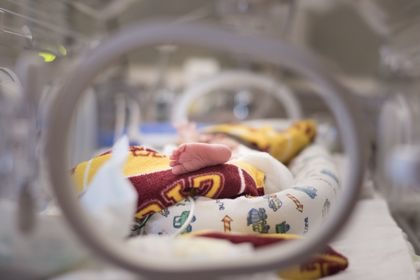Jaundice in Premature Babies
- Mrs. Maxeen V Campbell-Barnes

- Jun 9, 2022
- 3 min read
Jaundice is very common among newborns. Within a day or two of birth, around 60% of babies will develop the tell-tale yellow tinge to the skin and the whites of the eyes that indicate this typically temporary and benign condition.

Jaundice is caused by elevated levels of bilirubin in the blood (hyperbilirubinemia). It's easy to treat and rarely leads to other health problems. The major potential complication associated with jaundice in babies is a serious type of brain damage that's a risk if the condition isn't treated promptly and properly.
What can make jaundice potentially tricky for premature babies—those born before 35 weeks of gestation—is that they may be susceptible to this complication at lower levels of excess bilirubin than full-term babies. If you have a preemie with jaundice, your pediatrician will treat it with light therapy to make sure it resolves as soon as possible.3
Symptoms and Complications
Jaundice is especially common in babies born before 35 weeks. In most cases, the only symptom of the condition is a yellowish tint affecting the skin and whites of the eyes. This occurs because bilirubin literally is yellow-orange in color.2
If jaundice isn't treated promptly or properly, however, bilirubin can build up to dangerous levels. Untreated, excessively high levels of bilirubin can cause a severe form of brain damage known as kernicterus. Early symptoms of this condition include:4
Persistent or worsening yellowing of the skin and eyes
Extreme fatigue
Difficulty waking up or sleeping
Problems feeding
Extreme fussiness, often accompanied by a high-pitched cry
Limpness or stiffness of the body
Unusual eye movements
Muscle spasms
If your baby experiences any of these symptoms, get emergency help immediately. Kernicterus can cause permanent neurological damage, including hearing loss, cerebral palsy, intellectual disabilities, and even death.4
Causes and Risk Factors
Being premature increases a baby's risk of developing jaundice. Most babies who are born at term are able to metabolize bilirubin quite easily and pass it in their stools before too much accumulates. However, because a premature baby's liver isn't fully developed at birth, it may not fully metabolize bilirubin.3
According to a study published in 2019, up to 80% of premature infants have jaundice. About 2% develop kernicterus.4
Fortunately, jaundice is so easy to diagnose that it rarely gets bad enough to cause kernicterus. Premature babies who are at risk will have their bilirubin levels closely monitored with either a blood test or forehead meter.
In addition to preterm birth, risk factors for hyperbilirubinemia include:2
Having a sibling who was previously affected
Bruising during an instrumented deliveryin which forceps or vacuum extraction is used to help with childbirth
Delay in passing the baby's first stool, called meconium
Treatment
The first-line treatment for jaundice is phototherapy, in which a newborn is exposed to special lights known as bili lights. The light literally helps the baby's body break down bilirubin into a form that can be easily excreted.5
A baby being treated with phototherapy will be undressed except for a diaper so that as much skin as possible can be exposed to the light. Their eyes will be covered. They will lie in a warm bassinet or incubator—sometimes for several days—and their bilirubin levels will be measured at least once a day.
Phototherapy doesn't hurt your baby's skin at all. If you're nursing, you can breastfeed as usual. In fact, you may need to feed your baby more often, as phototherapy can be dehydrating. In some cases, you may need to give pumped breast milk in a bottle so your baby doesn't have to be removed from the phototherapy.
In the unlikely case that phototherapy doesn't work to bring your baby's bilirubin levels to normal, your doctor may suggest a somewhat risky procedure called an exchange transfusion. For this procedure, some of a baby's blood is removed and replaced with donor blood.6 As you can imagine, there are many pros and cons to this approach, so you and the pediatrician will want to discuss all of them carefully.
A Word From Verywell
When a baby is born before term, they are at risk for many potential health problems, including jaundice. Although this condition can be more problematic for premature babies since the clearing of bilirubin depends on liver maturity and a preemie's organs often are under-developed, jaundice is easy to treat effectively. Whatever else you might be facing if you have a premature baby, rest assured jaundice is one that your child's medical team will be able to handle and eliminate quickly.




















Comments